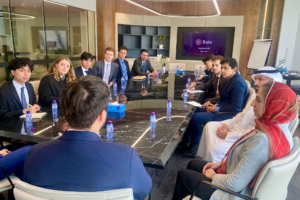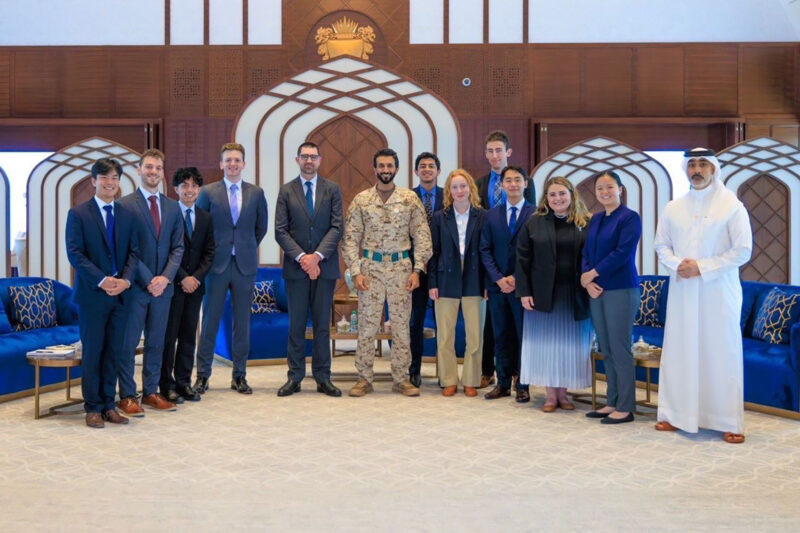Yale global affairs major Steven Zhang ’25 shares his experience from a trip to Bahrain last fall as part of a Jackson senior capstone course.
Under the guidance of Roland McKay, a Foreign Service officer and former Director for Gulf Affairs at the National Security Council, 11 senior global affairs majors dedicated their penultimate semester at Yale to researching U.S. emerging technology policy toward Bahrain as part of the Jackson School’s senior capstone course. In fall 2023, Bahrain became the sole Gulf partner of the Comprehensive Security Integration and Prosperity Agreement (C-SIPA). Originally envisioned as a regional framework to align Gulf states’ security and technological interests with those of the U.S., the agreement has yet to deliver substantial outcomes.
Our clients, the National Security Council and the U.S. State Department, tasked us with exploring how the U.S. government could leverage C-SIPA’s science and technology sector to deliver tangible economic benefits to Bahrain, while also demonstrating the agreement’s potential to attract other Gulf Cooperation Council (GCC) countries through advancements in emerging technologies.
Bahrain, home to the U.S. Navy’s 5th Fleet, serves as a strategic platform for American military operations. To gain a deeper understanding of this long-standing partnership, we visited the U.S. Embassy in Bahrain, where we met with chief Navy technologists from Task Force 59 (the Navy’s first unmanned and AI task force). These discussions shed light on U.S.-Bahraini collaborations in military technology, such as UAV testing and underwater communication cables. We also met with Ambassador Steven Bondy, Deputy Chief of Mission David Brownstein, and embassy staff to discuss U.S. engagement in Bahrain across military, technological, economic, and educational domains. The visit concluded with warm hospitality, as we left the embassy wearing U.S.-Bahraini flag pins, a symbol of camaraderie.
The following day began with a meeting with Joseph Dallago, co-founder and CEO of Rain, the Gulf region’s first cryptocurrency trading platform. We discussed Bahrain’s favorable regulatory environment for fintech start-ups and the support of its central bank as to why they establish operations in Bahrain’s capital, Manama.
Next, we met with His Highness Lt. Gen. Shaikh Nasser bin Hamad Al Khalifa, Bahrain’s national security advisor, and Col. Shaikh Khalid bin Ali Al Khalifa, deputy national security advisor. They offered invaluable insights into Bahrain’s national priorities, regulatory strategies, and incentives aimed at attracting foreign direct investment.

We then visited the HH Shaikh Nasser Center for AI Research and Development, which serves as a means for Bahrain to train their domestic workforce in artificial intelligence. We learned about the center’s current projects with government entities and private corporations across sectors such as oil, gas, finance, and telecommunications. In the afternoon, we met with CEO Bader Sater and COO Suzy Al Zeerah of Bahrain FinTech Bay. Our discussion highlighted Bahrain’s ambition to position itself as a financial technology leader in the MENA region through innovative incubation programs, accelerators, and educational initiatives.
Our next meeting of the day took us to Tamkeen, a government organization focused on economic growth through workforce upskilling and entrepreneurial support. We explored their efforts to strengthen cybersecurity infrastructure and empower businesses through financial aid and development programs. The day concluded with a roundtable discussion led by Dr. Hasan Alhasan, senior fellow for Middle East policy at the International Institute for Strategic Studies. This engaging dialogue centered on the implications of a potential Trump administration return for the Middle East and how Bahrain could capitalize on emerging opportunities.
Back in New Haven following the trip, we synthesized our findings into five policy recommendations aimed at enhancing U.S. support for Bahrain under C-SIPA. These were presented during our capstone’s final presentation and shared with policymakers at the Manama Dialogue, an annual forum addressing the Middle East’s pressing foreign policy and security challenges. Reflecting on our journey, we were deeply moved by Bahrain’s unparalleled hospitality — from the warm welcome at the airport to the fresh smoothies and delicious hors d’oeuvres at the palace — and were grateful to everyone who made the transformative experience possible.
